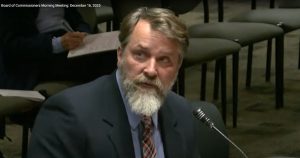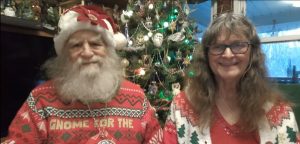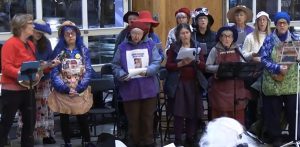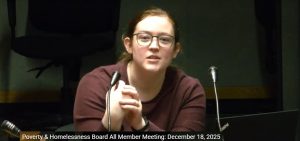KEPW News interviews ‘Water, Star Medicine’ filmmaker Lisa Spencer
14 min read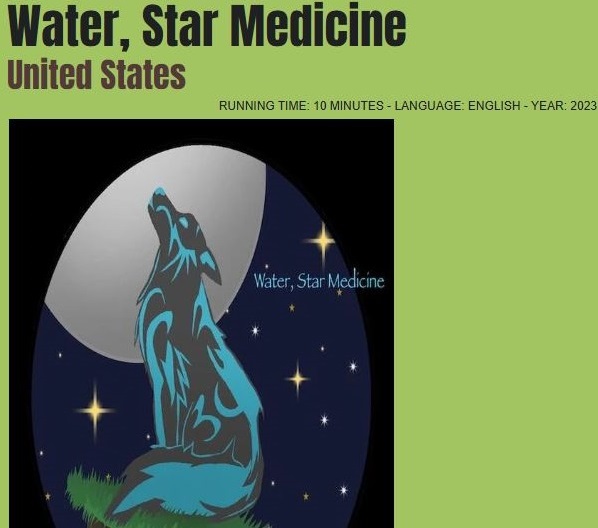
DJ Suss D: The Eugene Environmental Film Festival believes in creating space and a platform to address and bring light to critical issues facing our planet. They support the work being done at local and global levels and share a deep connection and responsibility to protect the environment and work in solidarity with others in the struggle for environmental justice.
[00:00:21] They do this through creating a 10-day event with meaningful and inspiring films, discussion, speakers, workshops, and special events in downtown Eugene and surrounding areas. They screen all films in person and offer online viewing with closed captions for accessibility. They also strive to provide opportunities to connect participants with outlets to take action on environmental and social justice issues.
[00:00:48] In addition, they carve out space for young filmmakers 18 years old and younger. The purpose is to highlight youth involvement and concern for and protection of the environment. Eugene is the birthplace of Our Children’s Trust, which is an organization to empower the voice of youth to protect the environment. If your film is chosen for the film festival, they aim to provide complimentary lodging at a homestay, film festival passes, and access to special events. In addition, filmmakers have an opportunity to discuss their film at screenings and special events. This is a great opportunity for filmmakers to promote their work, inspire change, and network with others.
[00:01:28] I spoke with filmmaker Lisa Spencer.
[00:01:31] Lisa Spencer: So I make films with children. And I have been in New Mexico for the last couple years and a lot of the films are environmental because of the cultures there and because of the environmental crisis that we’re facing with our water.
[00:01:45] So ‘Water, Star Medicine‘ talks about how the Rio Grande has been running for 400,000 years and in the last 20 it stopped running consistently through, because it was just the overconsumption of the water. So I taught middle school students and we dove into the science of water.
[00:02:07] And we have a—there’s an acequia system in New Mexico. So the acequias, they’ll run, and then they’ll shut off. So for example, if you have a ranch, you’ll have an acequia. You’ll have one hour on Tuesday from 3 to 4. So the acequias will open, you’ll have water, and then it’ll close, and we’re the only place in the world that has an acequia system.
[00:02:28] But of course if the Rio Grande isn’t working or running, then all the acequias are dry. So we’re in just a huge crisis because we just don’t have enough water because the overconsumption of—cause it’s the Colorado River, so of course Denver and all of the cities are pulling the water, so it’s not getting to New Mexico anymore.
[00:02:47] And then we interviewed a Maori scientist who’s a very powerful woman who’s traveling all around the world with her book, I don’t know the name of the book, but she, I contacted her ’cause I saw her work and it’s brilliant. And I said, ‘Hey, I’m teaching kids how to make a film on water. Can we interview you?’ And she said yes. And then she said we can use any of her footage.
[00:03:15] And we had her come to our class via Zoom. And she just taught us all about the intelligence, memory, and how we heal ourselves and make ourselves sick with our own water, with our own saliva, with our own thoughts, and I just think I give my kids a lot of new information about the power of water.
[00:03:30] DJ Suss D: So it sounds like it gives them hope, like, because the kids here at the University, they’re in despair over the, when I talk to them over the, over the environment. So how old are these kids? You’re giving them hope?
[00:03:48] Lisa Spencer: Thank you. Yeah, they are 11 to 13, and actually we studied Greta Thunberg, we watched her and studied her. We studied a lot of different children. So that’s how I started my course. I started, we started studying a lot of different children around the world who have changed the world for the better. And one of those children was Greta.
[00:04:14] And so I think, you know, it’s kind of like any movement. When you see somebody like you, you’re like, ‘Oh, oh, women can do that.’ ‘Oh, I’m a child. I can be a leader in the environment.’ Like, it really gave them a different way to use their voice.
[00:04:30] I think when we’re in despair, it’s because we aren’t participating in the change. I think when we’re participating in the change, we don’t feel the despair because we’re in the movement. So they don’t feel despair. They feel angry and they feel on fire. You know what I’m saying? Because they’re now participating. They’ve been on the radio and on the TV and on the film festivals and they’re really, you know, bringing their culture forefront.
[00:04:54] DJ Suss D: And so you’re empowering them. Can you give me an example, a specific example of a kid that was, came in one way and went out another?
[00:05:02] Lisa Spencer: Yes, I mean, Magnus, that’s my favorite. Magnus, who actually played the Drop of Water in the film. He came in to film. He wanted to be in the film class and he is from the Yu’pik Tribe. He’s Alaska Native and half-European and he never met his family, his Tribal, his Native family because his mother died when he was very young, an infant.
[00:05:31] And so he came in with ideas about this film that he wanted to make and he first came in with like a literally like a very, very long thick article about climate change and how it’s affecting Tribes in Alaska. And then he brought in a map and then he brought over the globe and he showed me, he’s like, ‘This is where my Tribe is.’ He’s like, ‘This is where my mother’s from. This is where my grandmother’s from. This is where I was, was where I’m from. and it’s, you know, I want to make a film about this.’
[00:06:00] And so, when he came in he was bullied, he was shy, he didn’t fit in, he was traumatized, he had been in foster care, you know, his mother was, you know, very disempowered because of what’s happening tribally in Alaska. And after two years of filmmaking, he is incredibly empowered.
[00:06:30] The first film, when he was making it, his grandma came to me and was like, ‘You know, he can’t make the film anymore. He’s not sleeping, he’s not doing well.’ And by the time the film was over, he was starting to really find his voice. And then he made another film in eighth grade.
[00:06:47] So the first film was “Kuinerraq,” it showed last year here. And he came and he got to feel incredibly proud of himself and of his people and where he came from. So he kept that theme. And this year he made another film called 35,567 Yu’pik Stories. And he interviewed the famous band Pamyua. And, you know, some people would say, ‘Well, that has nothing to do with the environment, per se. What was the topic of that film?’
[00:07:15] But Native people don’t really separate environment from anything else. It’s like part of spirituality. It’s part of identity. So it’s all in there, you know. And it’s in the lyrics. It’s in the dance. It’s in the style of the way they, you know, use the dance movements, it’s in the way, their language, you know, like however many words for the word snow, you know, I mean, it’s in everything that they do and so, yeah.
[00:07:47] I would say that the children maybe felt like and because they’re not being represented, you know, they’re not being represented in legislation, they’re not being represented in culture, they’re being told what their rights are, they’re being told where their voice is, they’re being silenced, and nobody really has a lot of value for who they are or what they have to say or how they feel.
And I was telling these folks earlier that they’re on the bottom, New Mexico was on the bottom for children’s rights, they’re on the bottom for education, you know, and so these children are just the least of the priority of anyone. And so all of a sudden there’s this new platform and it’s filmmaking and it’s storytelling. And now all of a sudden they’re on the top because they don’t have to ask permission for their voice. They’re being given a platform. So you can definitely feel a difference.
[00:08:49] And I do feel like these are our leaders, you know, because it doesn’t matter how conscious we are, or how good we are, or how much we try, we’re just never going to be at the same place as someone who’s still more connected to their spirituality than they are to the material world, because they haven’t been inundated into consumerism the same way that we have as adults.
And so they’re always going to be ahead of us, you know. So it’s incredible to see them when that light bulb goes on they’re like, ‘Oh wait a minute you know like they were they’ve been on the radio is telling these folks they were on AMC, ALLBLK, All Native, they’ve been on all of these different platforms talking about the environment and the water and respect and asking you know people for to give them more attention.
[00:09:37] So I have my Ph.D. was in social justice. I got into film work totally on accident. I am a musician, so I think it started there. But I work in legislation, and the children know what I do. And I was telling these folks– I was at a quinceañera, and there are all these students that I’ve known throughout the last couple of years are running up to me. And they’re like, ‘Can we make more movies?’ ‘What’s going on with the Rio Grande? Has there been any sort of new legislation around water usage?’ ‘Did you change the child marriage laws?’ ‘Is child pornography still legal in six ways with six exemptions in New Mexico?’
[00:10:08] I mean they just are they I mean no adult is coming up to me and asking me if the six exceptions for child pornography have been, you know, if there’s now there’s more exceptions, you know.
[00:10:21] The kids, they’re exhausted. You know people have been making excuses their entire lives, you know. Like, it’s all hands on deck, you know, so—
[00:10:31] DJ Suss D: Right, and so they set an example to other students. Magnus, other students have joined the cause.
[00:10:37] Lisa Spencer: Yeah, absolutely, and a lot of the cultural barriers start dissolving. I mean, being in New Mexico, it’s very multicultural, so it’s incredible to see different ages, different races, different economic backgrounds, different religions, all working together. It’s like they don’t even have those same divides.
[00:10:59] DJ Suss D: Are we going to see some politicians come out of this?
[00:11:03] Lisa Spencer: I hope so.
[00:11:04] DJ Suss D: It’s really important to get into them early, to get this going early.
[00:11:08] Lisa Spencer: It is, and I think there’s also a really big shift. I was telling these folks that, you know, during the relocation acts and the genocide of Native people, New Mexico was part of Mexico, and a lot of that area was Mexico. So the same history is different, right? It’s a different history.
[00:11:24] So a lot of the pueblos, the 13 pueblos of Santa Fe and the Taos Pueblo, and all these pueblos in Northern New Mexico are intact. They’ve been there for tens of thousands of years.
[00:11:33] So what’s happening in New Mexico, not just the children, but also there’s a real anti-colonial movement. And there is a reclaiming of not the environment as something that’s outside of us, like, water is not outside of us, our earth is not outside of us. And maybe it is for European people, maybe it is for American people, but for Native people and as an observation, it is their identity.
[00:12:02] And I think as that is being reclaimed and as that is being empowered in the communities with the women in the ceremonies, the way plant medicine is legalized, the way children are still, you know, celebrating their cultures and their pueblos.
[00:12:17] Like, it’s shifting. It’s like we’re shifting back to a better place because of this. And you’re right, when children are being kept in their culture and being empowered and their voices are being empowered and they’re really coming into their voices and saying, ‘You know, I’m not separate from the water. A Maori scientist who’s famous and beautiful and gorgeous told me so.’ I mean, what are you going to say?
[00:12:43] As far as the, on the hard side of things, it’s the 50th out of 50 as far as education, it’s the lowest, as far as child protection. I mean, some of the laws that I’m working on, I mean, I’ve never seen anything, it’s disgusting.
[00:12:56] I don’t know. I mean, this stuff is so heavy. But the United States is in a really bad place ethically and the way we treat our children is disgusting. I mean, you know, we’ve always raped children. We’ve always raped the land. We’ve always, you know, this is like who we are.
[00:13:11] But as the children are standing up and going, ‘Um, we don’t want to be raped anymore. Um, we want our river. Um, our education should be a priority,’ you know, like, they’re coming in strong, like, they’re pissed. And a lot of the children also have watched, they’re generationally, you know, things being taken and taken and taken.
[00:13:37] My boss at my last university I worked at did a TV show on HBO, a film, and one of the interviews that was done on a reservation in Arizona, she basically, they were talking about how all of the reservations are being rented from the U.S. government. And we’re watching this and I was showing the children some of these clips and they’re like, ‘I don’t understand. Like, they stole our land and now we have to rent it from them?’
[00:14:02] But there’s a whole agenda, the United States government even until the 1970s wanted to dissolve all Native reservations, so there’s an agenda. They want the reservations to fall and they want so many people to move off the reservations that so that they can reclaim that land and exploit it.
[00:14:19] And they want that to happen because what happens when people hold their language and hold their culture and hold their integrity and hold who they are as a people is that they go against the agenda of the United States government, right? So that’s why we saw in Oregon last year at this film festival where all these people right here in Oregon are being arrested and kicked off their own land because they want to be—because the people—because, you know, the European people want to mine it and make money, and the government wants to do it.
[00:14:45] So, you know, you can talk about New Mexico all day long, but Oregon’s just as bad as anywhere else. We’re all part of the problem, unless we’re part of the solution, right?
[00:14:53] DJ Suss D: You said their future, you know, the reason they’re pissed, though, is they’re going to end up working for a multinational corporation flipping burgers, or a clerk in some minute—they can see what’s going to happen to them in the future, is what I’m getting at.
[00:15:05] Lisa Spencer: I think they have more potential than any other group that I’ve seen in this country because they come from something. They come from integrity. They have sovereignty. They have their own passports. They’re not a part of, when this country goes down, they’re not a part of that. They didn’t make that happen. They were the ones that were trying to save it. They were the ones that were trying to preserve the water. They were the ones that pray for the water. They’re the ones that go into, you know, vision quests and longhouses and peyote meetings and they’re the ones that have been protecting the land since the beginning.
[00:15:37] They’re not the ones who destroyed the buffalo population. They’re not the ones who destroyed the water and the sky and the land. They have nothing, they have no, nothing on their, on their, you know, that’s not their story or their karma. They’re going to be fine. They know how to live in the desert without water.
[00:15:52] It’s the people who think, who don’t know how to, you know, like I was telling about the hurricanes, the people that don’t know how to live on the land for three days without going crazy. They’re the ones that have something to worry about. I’m not worried about these people, frankly. I’m worried about the people that are not protecting them.
[00:16:08] DJ Suss D: Well, that’s just it. They’re going to destroy that, make it to where they can’t do that. If we take over all the land, the corporations are making it to where, like with glyphosate, with Monsanto and stuff like that. If I can’t grow organically or even live out on the trail you know off the land anymore. They’re going to take it over to where they that you are forced into slavery, in other words. You’re forced to work for a corporation in order to live. You cannot live subsistence farming and subsistence living (crosstalk) will be a thing of the past.
[00:16:42] Lisa Spencer: And remember that quote like during Nazi Germany when they were like, oh, ‘First it was the handicapped people and then it was the people that were, like, homosexual and then it was the women that were—’
[00:16:51] DJ Suss D: ‘And then they came for me.’ It’s enclosure. They kept fencing off the land and the king you used to be able to go into the king’s forest, you know, Robin Hood. You could hunt deer in the king’s forest now. And then they put fences around and you can’t do that anymore.
[00:17:03] Lisa Spencer: Right? I feel like this entire country just needs to say, ‘Okay Monsanto, and people that want to destroy the earth and people that want to do these kinds of things,’ they can just have, like, they can have their own state or something.
[00:17:13] But yeah, I mean, we are buying into it every single day. We’re participating in it. We’re paying taxes on it. They’re putting us in a position where it’s just hard enough to even be in this country that we don’t even have the energy to fight for too much. And it’s very dangerous.
[00:17:30] And that’s what’s so great about children. They don’t have anything to lose. They’re like, ‘This is and this has to stop,’ but they come from somewhere that has taught them to be connected to something much bigger and much more beautiful and something much more powerful.
[00:17:45] So I do feel like there is a great hope for, I think this is the best young generation ever.
[00:17:52] DJ Suss D: They know there’s another way.
[00:17:53] Lisa Spencer: They know there’s another way. They’re tired of bull, they say it how they feel, they’re just, they’re articulate, they want to learn. And even the apathy that is here is because they are so in tune with how problematic our culture is.
[00:18:10] DJ Suss D: For more information on the Eugene Environmental Film Festival, go to EugeneEnvironmentalFilmFestival.org. For KEPW News, I’m DJ Suss D.
